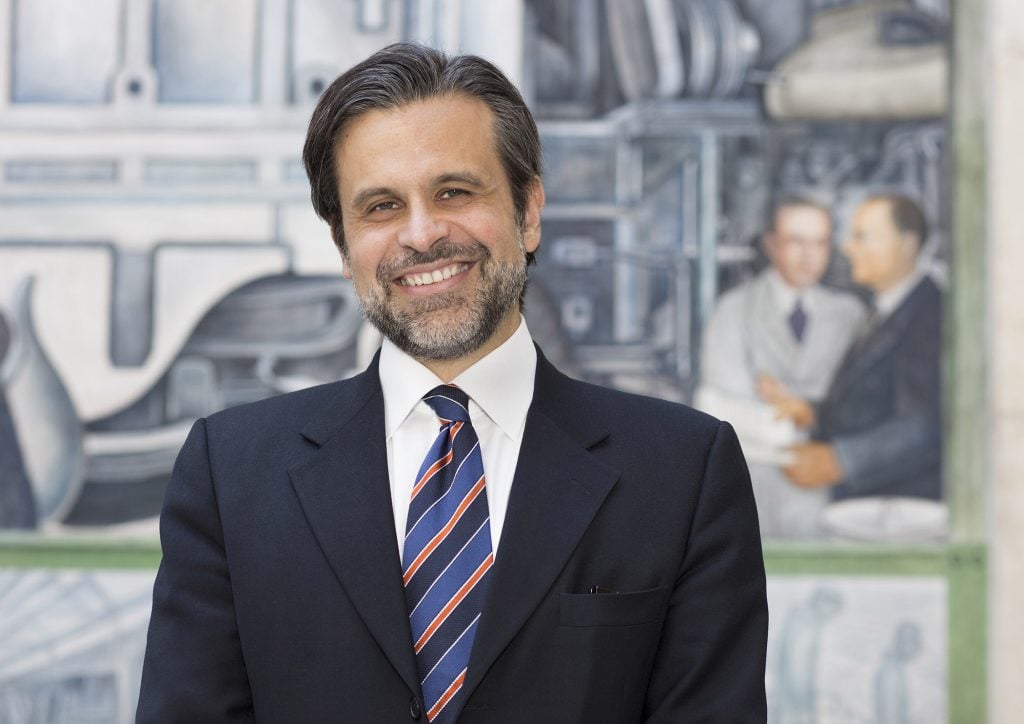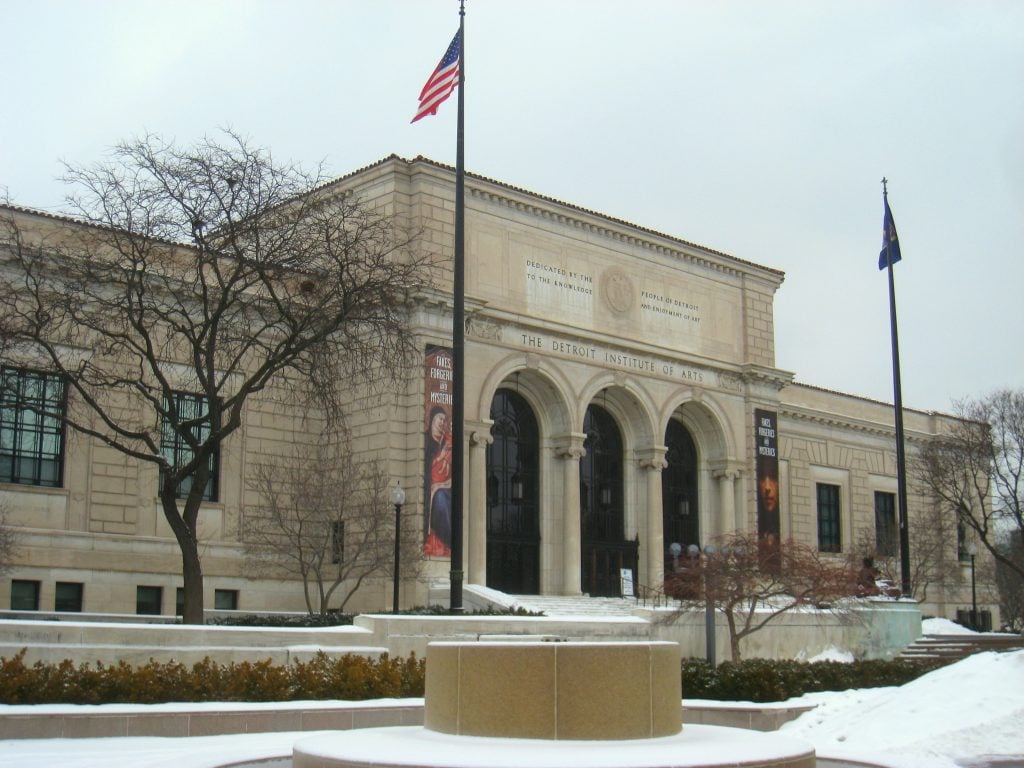Law & Politics
A Law Firm Has Cleared the Director of the Detroit Institute of Arts of Ethics Violations—But Critics Are Still Crying Foul
A whistleblower agency called the findings the result of an "unserious investigation."

A whistleblower agency called the findings the result of an "unserious investigation."

Rachel Corbett &
Zachary Small

A law firm has cleared the Detroit Institute of Arts’s director and board chair of ethical misconduct that was alleged in a July whistleblower complaint, according to a statement from the museum. But not everyone is convinced the institution’s problems have been satisfactorily addressed.
The complaint, which the legal nonprofit Whistleblower Aid filed with the IRS and the Michigan attorney general, accused museum director Salvador Salort-Pons of failing to properly disclose his family’s potential conflict of interest when he hung two paintings owned by a trust held by his wife and father-in-law at the museum, which could increase their market value.
When board chair Eugene Gargaro defended Salort-Pons by saying that the director had disclosed to him the details of the loans—for El Greco’s St. Francis Receiving the Stigmata and a painting attributed to the circle of Nicolas Poussin, An Allegory of Autumn—it prompted the whistleblowers to expand their complaint to include Gargaro too. (Salort-Pons was required to disclose the conflicts to a professional practices committee, not a single board member, they argued.)
The investigation, conducted by the Washington, DC-based law firm Crowell and Moring, concluded that Gargaro and Salort-Pons “acted in all respects with the best interests of the DIA in mind and did not find that they or any employee or volunteer at the DIA engaged in any misconduct related to the allegations included in the whistleblower complaint,” according to a statement from the museum. “There was no finding of any intention to mislead or hide information, nor was there any finding of any conflict of interest, violation of DIA policy, or violation of applicable law.”
A representative for the museum declined to release the investigation’s findings in full or to comment further.
Despite the investigation formally clearing Salort-Pons of wrongdoing, not everyone is reassured by its findings. Whistleblower Aid’s CEO and founder John Tye said in a statement that neither his organization nor its clients, who are current and former DIA employees, were contacted by the firm “during the course of what DIA describes as an ‘exhaustive’ investigation.” He also said that the fact that the report is not being released to the public indicates that “DIA is not serious about addressing the conflicts of interest disclosed by our clients.”
“How can the DIA be cleared of the charges if those making the allegations were never interviewed?” said Susan Larsen, a former director of publishing at the museum. “An investigation into whistleblower charges that never actually deals with the whistleblowers is a sham. And I think the DIA’s window dressing of the report, which has not been released, actually makes the museum—and Salvador—look worse.”

El Greco, St. Francis Receiving the Stigmata (ca. 1580-86).
Still, some employees continue to consider the director unfit to lead the museum for reasons beyond the conflict of interest investigation. Numerous current and former staffers told Artnet News that the director does not conduct equitable hiring practices and resists diversity and inclusion efforts. More recently, some say that his administration has insufficiently protected them during the coronavirus pandemic.
This summer, a group of current and former employees under the name DIA Staff Action contacted the museum consultant Kate Livingston to conduct an independent survey addressing the DIA’s office culture. (The format was modeled after an internal survey the museum conducts annually.) Preliminary findings published by Livingston’s company, Expose Your Museum, show that a vast majority of employees surveyed have lost faith in museum leadership.
Of the 75 staff members that responded, 76 percent said that they had concerns about unethical behavior in upper management. Seventy-nine percent of that same sample said that they disagreed with the way DIA leadership responded to the recent whistleblower complaint.
The survey also asked employees how they felt about the museum’s safety measures amid COVID-19 and found that workers polled were evenly divided on whether accommodations had been sufficient and whether managers ever pressured them to do additional work.
“We welcome feedback from our staff members, in large or small numbers, anonymously or publicly,” Christine Kloostra, the museum’s director of marketing and communications, told Artnet News. She noted that the museum’s total staff size is 379, which means that just “15 percent of current staff members have expressed their disagreement with the museum’s actions through the outside survey. As far as we are aware, full results have not been shared publicly and we are not aware of details around the goals, methodology, or accuracy.” The complete results are expected next week.

The Detroit Institute of Arts, Detroit, Michigan. Courtesy Wikicommons.
Some employees inside the museum view its pandemic precautions as dangerously lacking. Artnet News has confirmed that at least three employees filed complaints with the Michigan Occupational Safety and Health Administration (MIOSHA) between August and October. In the reports, employees allege that managers flouted social-distancing protocols during meetings, sowed confusion over quarantine measures, and allowed visitors into the museum past capacity.
Responding to one complainant, MIOSHA said that it had contacted the museum and provided it with a list of recommendations. Artnet News has also reviewed a letter sent by one of the agency’s industrial hygienists in August to Elliot Broom, vice president of museum operations.
“MIOSHA conducted an interview with the DIA in August regarding the complaints on file,” a museum representative said. “The inspector determined that the museum’s actions and protocols were sufficient and closed the file.”
MIOSHA said in its letter that it was not currently planning an inspection “due to the low or medium exposure risk classification of the establishment and jobs by OSHA and/or the absence of any allegations indicating a violation of our regulations.” It added that it reserved the right to carry out an inspection in the future.
A representative for MIOSHA said that it could neither confirm nor deny the receipt of the complaints, which are confidential until the agency determines how to proceed.
“The museum fixed some of the issues,” one of the complainants, who requested anonymity for fear of retaliation, told Artnet News. “But I would like to see more organization and clear communication from management.”
Another complainant agreed, saying that her attempts to get answers from the museum administration before filing with MIOSHA had failed. “Because human resources and executives don’t have to work inside the building, I honestly don’t think they care,” the DIA employee said. “If I send an email to human resources, it’s rare that I get an email back.”
The law firm investigating the whistleblower complaints suggested several “possible improvements to DIA processes and policies,” which the museum says it is currently considering.
It did not specify what these suggestions were, but said “the proposed changes are largely intended to help avoid appearances of conflicts of interest and to clarify potential policy ambiguities,” according to a statement from the museum. “Over the coming months, the DIA’s professional practices committee will complete a review of all such practices and policies with the intention of making recommendations to the board that would result in the DIA being a national leader in establishing best practices in these areas.”
A second investigation from the law firm into the museum’s workplace culture is still underway. But Whistleblower Aid isn’t optimistic about the museum’s openness to change.
“DIA board members know what’s going on here, and they apparently don’t care,” Tye said in a statement. “The unserious investigation and triumphant press release from DIA do not instill confidence that complaints about conflicts of interest, equity and workplace culture are being taken seriously. The demand for change and accountability will need to come from the community itself.”